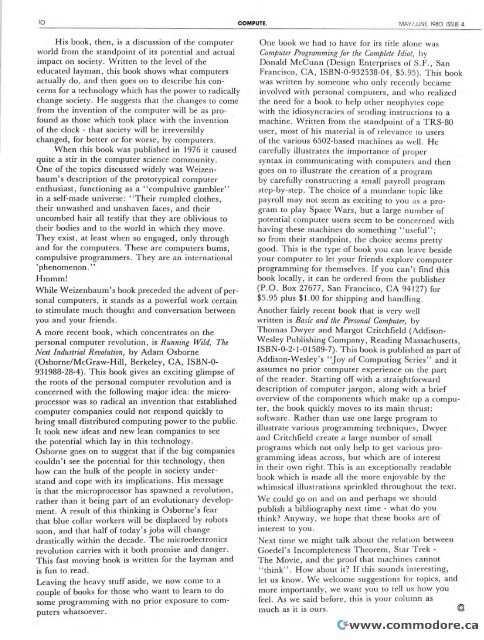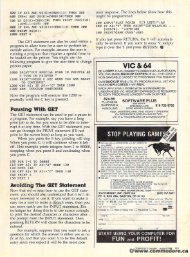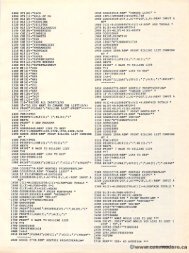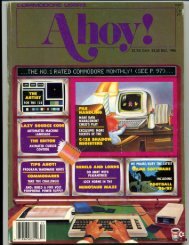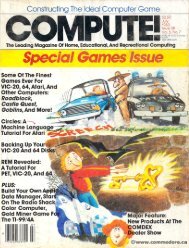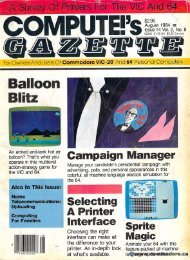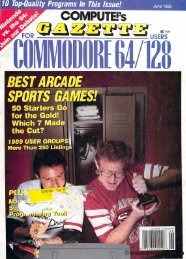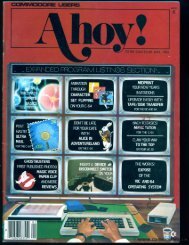May June 1980 - Commodore Computers
May June 1980 - Commodore Computers
May June 1980 - Commodore Computers
Create successful ePaper yourself
Turn your PDF publications into a flip-book with our unique Google optimized e-Paper software.
10 COMPUTE. MAY MAY/JUNE. I JUNE. <strong>1980</strong>. 198O. ISSUE ISSUE4.<br />
His book, then, is a discussion oof f the computerr<br />
world fro m the standpoint of its potential and actu al<br />
world from the standpoint of its potential and actual<br />
impact oon n society. . Written n to the level oof f the<br />
educated layman, this s book shows what computers<br />
actually do, and then goes on to describe his con<br />
actually do, and then goes on to describe his concerns<br />
for a technology which has the power to radicallyy<br />
change society. He suggests that the changes to come<br />
change society. He suggests that the changes to come<br />
from m the invention oof f the computerr will be as pro<br />
found as those which took place with the invention<br />
found as those which took pl ace with the in vention<br />
of the clock - that soc iety will be irreversibly<br />
One of the topics di scussed widely was Weizenbaum's<br />
description of the prototyp ical co mputer<br />
of the clock - that society will be irreversibly<br />
changed, , for better or for worse, by computers.<br />
When thiss book was published in 1976 it caused<br />
quite a stirr in the computer science community. .<br />
One of the topics discussed widely was Weizenbaum's<br />
description of the prototypical computer<br />
enthusiast, functioning as a "compulsive gambler"<br />
in a self-made universe: ."Their 'The rumpled clothes,<br />
their unwashed and unshaven faces, and their<br />
uncombed hair all testify that they are oblivious to<br />
uncombed hair all testify th at they are oblivious to<br />
their bodies aand to thee world in which they move.<br />
They ex ist, at least when so engaged, onl y through<br />
They exist, at least when so engaged, only through<br />
and for the computers. These are computers bums,<br />
compulsive programmers. They are an international<br />
,'phenomenon."<br />
. II<br />
Hmmm!<br />
While Weizenbaum's book preceded the advent of per<br />
While Weizenbaum's book preceded the advent of per<br />
sonal computers, , it stands as a powerful work certain<br />
to stimulate much thought and conversation between<br />
you and your friends.<br />
you and your friends.<br />
A more recent book, which concentrates on the<br />
personal computer r revolution, is Running Wild, The<br />
Next Industrial Revolution, by Adam OsborneO (Osborne/McGraw-Hill, Berkeley, , CA, ISBN-O-<br />
931988-28-4). This book gives an exciting glimpse of<br />
931988-28-4). This book gives an exciting glimpse of<br />
the roots of the personal computer revolution n and is<br />
concerned with the followin g major idea: the micro<br />
concerned with the following major idea: the micro<br />
processor was so radical an invention that established<br />
computer companies could not respond quickly to<br />
computer companies could not res pond quickly to<br />
bring small distributed computing power to the public.<br />
bring small distributed computing power to the public.<br />
It took new w ideas and new lean companies to see<br />
the potential which lay in this technology.<br />
OsborneO goes on to suggest that if the big companies<br />
couldn't t see the potential for this technology, then<br />
how can the bulk of the peo ple in society under<br />
how can the bulk of the people in society under<br />
stand and cope with w its s implications. His message<br />
is that the microprocessor has spawned a revolution,<br />
,<br />
rather than it being part of an evolutionary develop<br />
rather th an it being pa rt of a n evolutionary development.<br />
A result of this thinking is Osborne's fear<br />
that blue collar workers will be displaced by robots<br />
soon and that half of today's jobs will change<br />
soon, and that half of today's jobs will change<br />
drastically dras;icall y within the decade. . The microelectronics<br />
revolution carries with it both promise and danger.<br />
This fast moving book is written for the layman and<br />
This fa st moving book is written for the layman and<br />
is fun to read.<br />
Leaving the heavy stuff aside, we now come to a<br />
couple of books for those who want to learn to do<br />
some programming with no prior exposure to com <br />
puters whatsoever.<br />
OOne book we had to have fo for r it its s title alone was<br />
Compuler Computer Programming Jor for Ihe the Com/)Iete Complete Idiot, by<br />
Donald McCunn (Design Enterprises of S. S.F., San<br />
Francisco, CA, ISBN-0-932538-04, $5.95). This book<br />
Francisco, CA, ISBN-0-932538-04, $5.95). This book<br />
was written by someone who only recently became<br />
in involved with personal computcrs computers, , and who realized<br />
the need for a book to help other neophytes co cope<br />
with the idiosyncracies oof f sending instructions to a<br />
machine. Written from the standpoint of a T RS-80<br />
machine. Written from the standpoint of a TRS-80<br />
user, most oof f his s material is ooff relevance to users<br />
of the various 6502-based machines as wel l. He<br />
of the various 6502-baaed machines as well. He<br />
carefullyy illustrates the importance of proper<br />
syntax in communicating Ling with computcrs computers and then<br />
goes oonn to illustrate the creation of a program<br />
by carefullyy constructing a small payroll program<br />
step-by-s tep. The choice of a mundane topic like<br />
step-by-step. The choice of a mundane topic like<br />
payroll may not seem as exciting g to you as a program<br />
to pl ay Space Wa rs, but a la rge nu mber of<br />
gram to play Space Wars, but a large number of<br />
potential computer users seem to be concerned with<br />
having these machines do something "useful"; ";<br />
so from their standpoint, , the e choice seems prettyy<br />
good. . This is the type of book you can leave beside<br />
your computer to let your friends explore computer<br />
programming for themsel ves. If you can't fi nd this<br />
programming for themselves. If you can't find this<br />
book locally, it can be ordered fromm the publisher<br />
(P.O. Box 27677, , San Francisco, CCAA 9'f 94127) I27) for<br />
$5.95 plus $1 .00 for shipping and handli ng.<br />
$5.95 plus $1.00 for shipping and handling.<br />
Another fairl y recent book that is very well<br />
Another fairly recent book that is very well<br />
writtenn is Basic and the Personal Computer, by<br />
ThomasT Dwyer and Margot Critchfield (Addison- n<br />
Wesley Publishing Company, Reading Massachusetts,<br />
Wesley Publishing Company, Reading Massachusetts,<br />
ISBN-0-2-1-01589-7). This book is published as part of<br />
Addison-Wesley's "J oy of Computing Series" and it<br />
Addison-Wesley's "Joy of Computing Series" and it<br />
assumes no prior computer experience on the part<br />
of th e reader. Sta rting off wi th a straigh tfo rwa rd<br />
of the reader. Starting off with a straightforward<br />
description ion of computer r jargon, , along with a brief<br />
overview of the components which make up a computer<br />
, the book quickly moves to its main thrust:<br />
ter, the book quickly moves to its main thrust:<br />
software. Rather R r than use one large program to<br />
illustrate various programming techniques, Dwyer<br />
and a Critchfield create a large rge number of small<br />
programs which not onl y help to get various pro<br />
programs which not only help to get various pro<br />
gramming ideas across, , but which are of o f interest<br />
rest<br />
in their ir own right. This is an exceptionally readable<br />
book which is made all the more enjoyable by the<br />
book which is made all the more enjoyable by the<br />
whimsical illustrations tio ns sprinkled throughout the text.<br />
We could go on and on and perhaps ps we should<br />
publish a bibliography next time - what do you<br />
thi nk? Anyway , we hope that these books a re of<br />
think? Anyway, we hope that these books are of<br />
interest to you.<br />
.<br />
Next time we might talk about the relation n between<br />
Goedcl 's Incompleteness T heorem , Star T rek -<br />
Goedel's Incompleteness Theorem, Star Trek -<br />
The T he Movie, M and the proof that machines cannot<br />
" thin k". H ow about it? If this sounds illleresting,<br />
"think". How about it? If this sounds interesting,<br />
let us know. We welcome suggestions for topics, and<br />
more re importantly, we want you to tell us how you<br />
feel. As we said before, , this s is is your column as<br />
much as it it is is ours.<br />
©


